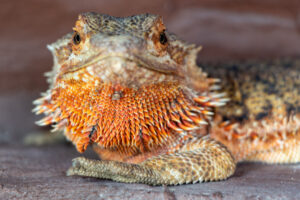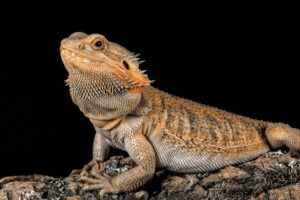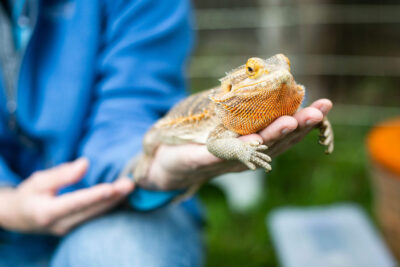If you’ve ever found yourself pondering the culinary preferences of our scaly companions, you might be wondering, “Do bearded dragons eat carrots?” Well, buckle up, because we’re about to embark on a journey into the dietary habits of these charming little dragons.
Whether you’re a seasoned beardie aficionado or a first-time dragon parent, the question of introducing carrots into their menu is a valid and intriguing one. So, grab a seat and let’s unravel the mysteries of bearded dragon nutrition, with a special focus on the age-old query: Do bearded dragons eat carrots?
Do bearded dragons eat carrots?

Are carrots a safe treat for bearded dragons?
Yes, carrots can be a safe and nutritious treat for bearded dragons when offered in moderation. Carrots contain beta-carotene, which is a precursor to vitamin A, an essential nutrient for reptiles.
However, it’s important to prepare and offer carrots properly:
- Cut into Small Pieces: Chop or shred the carrots into small, manageable pieces to make it easier for your bearded dragon to eat.
- Moderation: Treats, including carrots, should be offered in moderation. The majority of a bearded dragon’s diet should consist of leafy greens and insects.
- Variety: Ensure that the carrot treats are part of a varied diet. Bearded dragons benefit from a diverse range of vegetables, greens, and insects to meet their nutritional needs.
- Organic and Clean: Use organic carrots if possible, and always wash them thoroughly to remove any pesticides or contaminants.
- Cooking: While some vegetables are better served cooked for improved digestibility, bearded dragons can eat carrots both raw and cooked. If cooked, avoid using any seasonings or oils.
Remember that individual bearded dragons may have different preferences, and it’s crucial to monitor their reactions to new foods. If you have any concerns about your bearded dragon’s diet or health, consult with a veterinarian experienced in reptile care.
Nutritional benefits of carrots to bearded dragons
Carrots can offer several nutritional benefits to bearded dragons when included as part of a balanced diet. Here are some of the nutritional components found in carrots that can be beneficial:
- Beta-Carotene: Carrots are rich in beta-carotene, which is a precursor to vitamin A. Vitamin A is essential for maintaining healthy skin, vision, and the immune system in bearded dragons.
- Fiber: Carrots contain dietary fiber, which can contribute to healthy digestion in bearded dragons. Adequate fiber is important for preventing constipation and maintaining gut health.
- Water Content: Carrots have a relatively high water content, which can help keep bearded dragons hydrated. However, it’s important to note that bearded dragons should primarily obtain water from drinking and not solely rely on moisture in their food.
- Antioxidants: Carrots contain antioxidants, including various phytochemicals, which can help neutralize free radicals and support overall health.
While carrots have nutritional benefits, it’s crucial to offer them as part of a varied and balanced diet. Bearded dragons require a mix of vegetables, leafy greens, and insects to ensure they receive all the essential nutrients.
Additionally, moderation is key, as excessive consumption of certain foods, including carrots, can lead to nutritional imbalances. Always consult with a veterinarian specializing in reptile care for guidance on the best diet for your individual bearded dragon.
Precautions when feeding carrots to bearded dragons
Feeding carrots to bearded dragons can be part of their diet, but there are precautions to keep in mind to ensure the health and well-being of your reptile. Here are some guidelines:
- Moderation is Key:
- Carrots are high in beta-carotene, which is converted into vitamin A. While vitamin A is essential for bearded dragons, excessive amounts can lead to toxicity. Feed carrots in moderation as part of a varied diet.
- Size and Preparation:
- Cut carrots into small, manageable pieces to prevent choking. Bearded dragons are more likely to eat smaller pieces that they can easily handle.
- Variety in Diet:
- Carrots should not be the sole vegetable in their diet. Bearded dragons require a diverse range of vegetables, greens, and occasional fruits to meet their nutritional needs.
- Organic and Washed:
- Whenever possible, choose organic carrots to minimize the risk of pesticide exposure. Thoroughly wash and peel the carrots to remove any residues.
- Nutrient Balance:
- Carrots are relatively high in sugar compared to other vegetables. Balance their diet with low-sugar, high-calcium vegetables such as collard greens, mustard greens, and dandelion greens.
- Avoid Feeding Tops:
- Be cautious with feeding the green carrot tops. They contain oxalates, which can bind with calcium and may contribute to the formation of kidney stones over time.
- Monitor for Allergies or Digestive Issues:
- Introduce carrots gradually and observe your bearded dragon for any signs of allergies or digestive problems. If you notice any adverse reactions, consult with a reptile veterinarian.
- Supplementation:
- While carrots provide some vitamin A, bearded dragons also need vitamin D3 for proper calcium absorption. Ensure they are receiving a balanced diet, and consider reptile-specific vitamin and mineral supplements as recommended by a veterinarian.
- Freshness:
- Always provide fresh carrots. Remove any uneaten portions after a feeding session to prevent spoilage and bacterial growth.
- Consult with a Veterinarian:
- If you have any concerns about your bearded dragon’s diet or health, consult with a reptile veterinarian. They can provide personalized advice based on the specific needs of your individual pet.
Remember, the key to a healthy bearded dragon is a well-balanced and varied diet, proper lighting, and appropriate habitat conditions. Regular veterinary check-ups are also crucial to ensure your pet’s overall well-being.
Health risks with giving bearded dragons carrots

Carrots types for bearded dragons
Bearded dragons can eat a variety of vegetables, and carrots can be included in their diet in moderation. However, it’s important to note that carrots are high in oxalates, which can bind calcium and may not be suitable for regular feeding. Feeding carrots occasionally as part of a varied diet is generally fine.
When offering carrots to your bearded dragon, it’s best to choose the following types:
- Carrot Greens/Leaves: The leafy green tops of carrots are generally more suitable for bearded dragons than the actual carrot itself. They provide a good source of fiber and nutrients without the high oxalate content found in the root.
- Carrot Sticks (in moderation): If you want to offer the root part, you can cut it into small, thin sticks. This allows your bearded dragon to consume it more easily.
Always ensure that the carrots are fresh, clean, and pesticide-free. Wash them thoroughly before serving. Additionally, remember to incorporate a variety of vegetables and fruits into your bearded dragon’s diet to ensure they receive a balanced nutritional intake.
It’s crucial to monitor your bearded dragon’s health and behavior. If you notice any signs of digestive issues or if your dragon refuses to eat certain foods, it’s recommended to consult with a veterinarian who specializes in reptile care.
Alternatives to carrots for dragons
Bearded dragons benefit from a diverse diet that includes a variety of vegetables, fruits, and insects. Here are some alternatives to carrots that you can offer to your bearded dragon:
- Leafy Greens:
- Collard greens
- Mustard greens
- Turnip greens
- Dandelion greens
- Kale (in moderation)
- Vegetables:
- Bell peppers (red, yellow, or green)
- Butternut squash (cooked and peeled)
- Zucchini
- Acorn squash (cooked and peeled)
- Cucumber (remove seeds)
- Fruits (in moderation):
- Berries (strawberries, blueberries, raspberries)
- Papaya
- Mango (remove the pit)
- Kiwi (peeled)
- Watermelon (seedless)
- Herbs:
- Parsley
- Basil
- Cilantro
- Mint
- Protein (insects):
- Crickets
- Dubia roaches
- Mealworms (in moderation)
- Superworms (in moderation)
- Black soldier fly larvae
Remember to chop or shred the vegetables and fruits into appropriately sized pieces for your bearded dragon, considering its size and age. Also, ensure that any insects offered are appropriately sized and gut-loaded (fed a nutritious diet) before being given to your pet.
Rotate the types of vegetables and fruits regularly to provide a well-rounded and balanced diet. Additionally, always check for any potential toxicity or harmful substances in the foods you offer, and be cautious about the oxalate content in certain vegetables to prevent overconsumption.
Always provide fresh, clean water for your bearded dragon as well. If you have specific concerns or questions about your dragon’s diet, consult with a reptile veterinarian for personalized advice.
Conclusion
On this page, we have got you the answer to the question do bearded dragons eat carrots. Bearded dragons can eat carrots in moderation, with a preference for the leafy green tops rather than the root. While carrots offer some nutritional benefits, they are high in oxalates, so they should be part of a varied diet alongside other vegetables, fruits, and insects.
Also, it’s important to monitor your bearded dragon’s health and preferences, and consulting with a reptile veterinarian can provide tailored advice for a well-balanced and nutritious diet.

